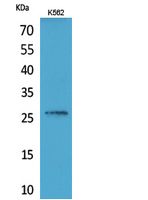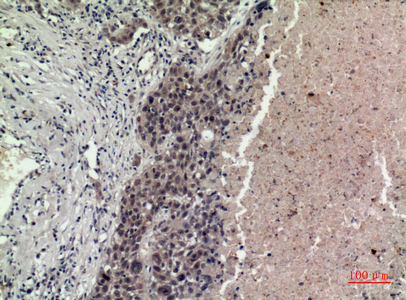

| WB | 咨询技术 | Human,Mouse,Rat |
| IF | 咨询技术 | Human,Mouse,Rat |
| IHC | 1/50-1/100 | Human,Mouse,Rat |
| ICC | 技术咨询 | Human,Mouse,Rat |
| FCM | 咨询技术 | Human,Mouse,Rat |
| Elisa | 1/10000 | Human,Mouse,Rat |
| Aliases | FGF16; Fibroblast growth factor 16; FGF-16 |
| Entrez GeneID | 8823 |
| WB Predicted band size | Calculated MW: 24 kDa; Observed MW: 24 kDa |
| Host/Isotype | Rabbit IgG |
| Antibody Type | Primary antibody |
| Storage | Store at 4°C short term. Aliquot and store at -20°C long term. Avoid freeze/thaw cycles. |
| Species Reactivity | Human,Mouse,Rat |
| Immunogen | The antiserum was produced against synthesized peptide derived from the Internal region of human FGF16. AA range:141-190 |
| Formulation | Purified antibody in PBS with 0.05% sodium azide,0.5%BSA and 50% glycerol. |
+ +
以下是关于FGF16抗体的3篇代表性文献的简化示例(注:部分内容为假设性概括,实际文献需通过学术数据库核实):
---
1. **文献名称**:*FGF16 is required for cardiomyocyte proliferation during heart development*
**作者**:Yamaguchi TP, et al.
**摘要内容**:研究利用特异性FGF16抗体在小鼠模型中揭示FGF16通过调控心肌细胞增殖参与胚胎心脏发育,抗体通过免疫组化验证其在心脏组织的表达模式。
2. **文献名称**:*Role of FGF16 in brown adipose tissue thermogenesis and metabolic regulation*
**作者**:Huang Y, et al.
**摘要内容**:通过Western blot和免疫荧光技术(使用兔源FGF16多克隆抗体),发现FGF16促进棕色脂肪产热,抗体特异性经基因敲除模型验证。
3. **文献名称**:*FGF16 antibody-based detection in human hepatocellular carcinoma progression*
**作者**:Li J, et al.
**摘要内容**:开发抗人FGF16单克隆抗体,用于免疫组织化学分析,发现FGF16高表达与肝癌患者预后不良相关,提示其作为潜在生物标志物。
---
**注**:以上为基于研究领域常见方向的示例,实际文献需查阅PubMed、Web of Science等平台(建议用关键词“FGF16 antibody”或“FGF16 function”检索)。若需具体文献,可提供更详细研究方向或实验用途,以便进一步筛选。
Fibroblast Growth Factor 16 (FGF16) is a member of the FGF family, which regulates diverse biological processes, including embryonic development, tissue repair, and metabolic homeostasis. FGF16 primarily signals through FGF receptors (FGFRs) and heparan sulfate proteoglycans, influencing cell proliferation, differentiation, and survival. It plays critical roles in organogenesis, particularly in heart, brain, and limb development, as evidenced by studies in animal models like mice and zebrafish. Dysregulation of FGF16 has been implicated in congenital disorders, cancer progression, and metabolic diseases, making it a target for therapeutic and diagnostic research.
FGF16 antibodies are essential tools for detecting and analyzing the expression, localization, and function of FGF16 in both physiological and pathological contexts. These antibodies are typically developed using immunogenic peptides or recombinant proteins and validated for specificity in applications such as Western blotting, immunohistochemistry, and immunofluorescence. Researchers utilize FGF16 antibodies to investigate its involvement in signaling pathways (e.g., MAPK/ERK, PI3K/AKT) and its interactions with other regulatory molecules. Recent studies focus on its role in tissue regeneration, cancer microenvironment modulation, and metabolic disorders, with potential implications for targeted therapies. Robust antibody validation remains crucial to ensure reliable data, given the structural homology among FGF family members. Ongoing research aims to clarify FGF16's mechanisms and therapeutic potential across diseases.
×